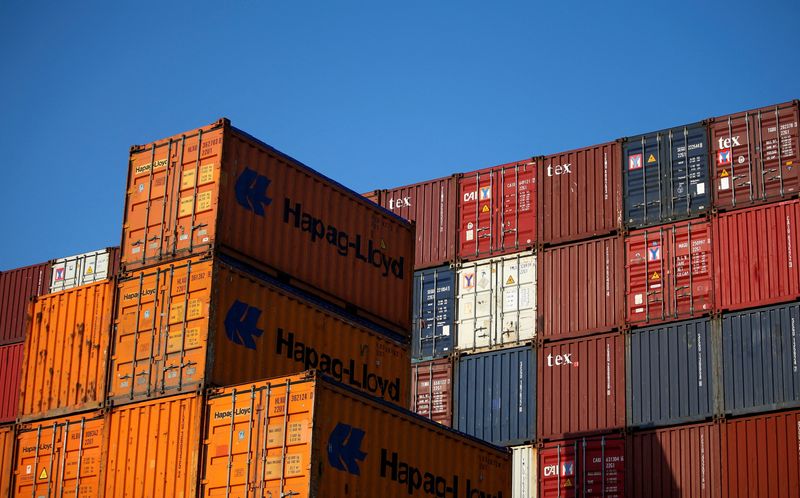By Christoph Steitz and Patricia Weiss
FRANKFURT (Reuters) -Germany's chemicals sector, Europe's largest, is starting to feel the pinch from delayed shipments via the Red Sea, becoming the latest industry to warn of supply disruptions that have forced some companies to curb production.
Crucial Asian imports to Europe ranging from car parts and engineering equipment to chemicals and toys are currently taking longer to arrive as container shippers have diverted vessels around Africa and away from the Red Sea and Suez Canal, following attacks by Yemen's Houthis.
While German industry has got used to supply disruptions in the wake of the pandemic and Ukraine war, the impact of reduced traffic via the trade artery is starting to show, with Tesla's Berlin factory the most prominent victim so far.
Germany's chemicals sector, the country's third-biggest industry after cars and engineering with annual sales of around 260 billion euros ($282 billion), relies on Asia for around a third of its imports from outside Europe.
"My procurement department is currently working three times as hard to get something," said Martina Nighswonger, CEO and owner of Gechem GmbH & Co KG, which mixes and bottles chemicals for big industrial clients.
As a result of the delays, Gechem, which makes annual sales in the double-digit millions of euros, has lowered production of dishwasher and toilet tablets because it can't get enough trisodium citrate as well as sulfamic and citric acid.
The company is therefore reviewing its three-shift system, Nighswonger said, adding the ripple effects from the transport squeeze could remain a problem for the first half of 2024 at least.
This is causing frank discussions with customers, Nighswonger added.
"If we get three truck loads instead of six, each customer only gets part of their order quantity, but at least everybody gets something," she said.
Bigger speciality chemicals maker Evonik also said it was being hit by "short notice routing changes and delays", adding some ships had changed direction as many as three times within a few days.
The company said it was trying to mitigate the impact by ordering earlier and switching to air freight, which is considered a stopgap because some chemicals are not allowed to be transported by plane.
ASIAN DEPENDENCE
JP Morgan on Monday said that while shipping disruption in the Red Sea and the Panama Canal was driving chemical prices it could also accelerate companies' restocking efforts and therefore lead to higher demand.
This, "if sustained, might alleviate the pressure from Chinese chemical exports and potentially result in some strengthening in prices/margin and as a result inventory restocking", the brokerage wrote.
German industry body VCI has long pointed to the dependence on Asian imports, saying that while production outages should be limited to individual cases, import delays via the Red Sea were an additional burden for an already weakened industry.
"The effects are particularly noticeable in medium-sized fine and speciality chemicals companies," VCI chief economist Henrik Meincke said, adding these companies often source a sizeable proportion of their raw materials from Asia.
The Red Sea transport crisis comes as Germany's economy is already under pressure due to a recession, as well as high labour and energy costs. According to S&P Global, Europe's chemicals sector, along with cars and retail, is seen as the most vulnerable.
In addition to delayed imports, chemicals groups point to higher fuel costs, as tankers transporting crucial raw materials take around 14 days longer to arrive, adding these costs can only be partially passed on to customers.
Others are less impacted.
Covestro, which makes foam chemicals used in mattresses, car seats and building insulation, expects to incur higher freight prices, but added these were insignificant within its overall spending.
It said an internal task force was dealing with the issue, still pointing to its strong regional footprint.
Fragrance maker Symrise, too, said it did not expect delays in its deliveries because it had enough safety stocks, and it called on customers stick with their usual ordering patterns to head off any unwarranted hoarding.
Wacker Chemie, which supplies polysilicon for roughly half the world's chips, also pointed to higher prices, but added its business had not been significantly affected so far.

VCI's Meincke sees a fairly low chance of widespread production outages even if the Red Sea situation remains tense, adding that with weak demand, red tape and high energy and raw materials costs the sector had enough to worry about already.
($1 = 0.9212 euros)